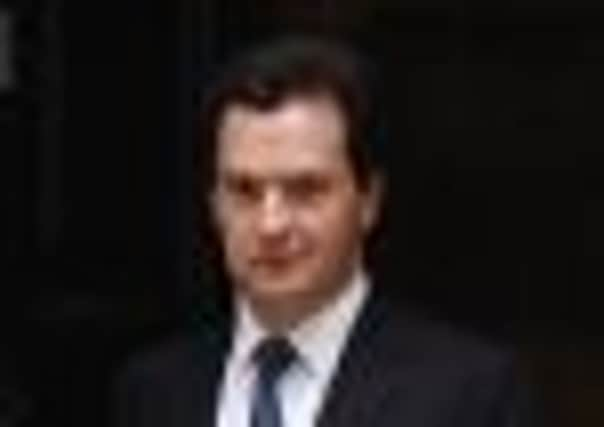Nathalie Thomas: UK economy hit by fallout as eurozone burnout gathers pace


Chancellor George Osborne faces an unenviable task in 2012 as he grapples with breathing life back into an economy which, according to some forecasters, may already be in recession.
There was a sharp intake of breath in the House of Commons in late November when, during the Autumn Statement, it was revealed that the Office for Budget Responsibility had taken an axe to its GDP forecast for next year, slashing it from 2.5 per cent to 0.7 per cent.
Advertisement
Hide AdAdvertisement
Hide AdOthers are far less optimistic, with IHS Global Insight economist Howard Archer yesterday estimating growth of just 0.3 per cent.


“2012 is clearly going to be a very difficult year for the UK economy, with modest contraction likely to occur in the early months in the face of rising unemployment and a still significant squeeze on consumers’ purchasing power coming from high inflation, muted wage growth and tight fiscal policy,” Archer said. “Tight fiscal policy will also obviously weigh down on government spending and investment. Meanwhile, business investment is likely to be muted as a consequence of recent weakened economic activity and the worrying outlook.”
After two tough quarters, Archer believes the economy will pick up in the second half of the year as Britain enjoys a boost from the Olympics and inflation continues its fall from its current 4.8 per cent towards the Bank of England’s 2 per cent target.
However, Archer’s 0.3 per cent GDP forecast places him in the optimists’ camp. Economists at Standard Chartered, who topped 354 organisations for accuracy in their forecasting over the past two years, are braced for a contraction of 1.3 per cent in 2012 as the UK is hit by a triple storm of public sector cutbacks, a fall in real incomes and the knock-on effects of a shrinking European economy.
Prime Minister David Cameron has done his utmost to try and distance Britain from events across the channel but economists point out that the eurozone is still the UK’s biggest trading partner, with just under 50 per cent of everything we produce for export heading to the 17-country bloc. A protracted recession in Europe would, therefore, also drag Britain down into the mire.
Although most economists are banking on European politicians somehow muddling their way through, none will deny that the eurozone crisis is the biggest question mark hanging over Britain’s economic prospects this year and beyond.
London-based think-tank, the Centre for Economics and Business Research, warned a Lehman Brothers-style financial collapse remains a likelihood despite endless summits and announcements from European leaders.
Philip Shaw, chief economist at Investec, is sceptical that the steps taken so far have made even the slightest dent in the problem. He believes billions more euros will need to be thrown at the crisis in order to stop the markets from preying on vulnerable economies such as Italy, Greece and Spain.
Advertisement
Hide AdAdvertisement
Hide AdHe said: “Over the past year we have seen more than 20 meetings of European leaders and finance ministers, but so far they have yet to agree on a set of policy measures that provide an immediate and lasting solution to the euro crisis.
“We continue to believe that euro leaders do not have the political will or the financial fire power to agree to such a solution and hence we remain of the view that the eventual solution will need to come from an international – likely International Monetary Fund – backed ‘bazooka’ backstop of around €2 trillion (£1.7tr).”
The new year will kick off with another string of meetings, on 23 and 24 January, followed by a summit of European leaders on 31 January.
Until then, economists and traders expect the markets to remain volatile as investors pray that policymakers are able to agree an orderly solution before another major economy such as Italy – which is considered “too big to bail” – falters.
Although Osborne has stuck steadfastly to his “plan A” of deficit cuts, the markets have made it clear that Britain’s AAA debt rating is far from safe and agency Moody’s fired a warning shot before Christmas as it put all of its European ratings under review – not just the eurozone.
The Bank of England is likely to further bolster Britain’s defences against the rising economic storm in February when governor Sir Mervyn King is expected to show the green light to further quantitative easing.
In October, the Bank’s asset purchasing programme was boosted by £75bn to £275bn but some economists believe QE will eventually reach a total sum of around £500bn.
While the outlook is bleak on a UK level, the picture for Scotland is even darker, according to the Ernst & Young Item Club group of economists, which expects 0.4 per cent less growth next year north of the Border compared to the UK as a whole.
Advertisement
Hide AdAdvertisement
Hide AdDougie Adams, senior economic adviser to the Scottish Item Club, has warned of a “lost decade” of anaemic GDP and jobs growth in Scotland, with particular fears over youth unemployment.
But as Britain enters another year of economic uncertainty there is at least one factor households can count on – interest rates are highly unlikely to move from their historic low of 0.5 per cent any time soon, potentially not until 2013.
And Archer said yesterday: “In fact, it is far from inconceivable that the Bank of England could hold off from raising interest rates until 2014.”